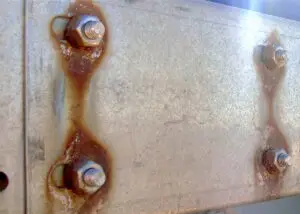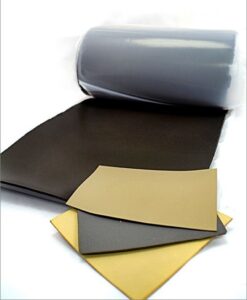Conductive gaskets can provide electrical and/or thermal conductivity.
- Electrical conductivity is a measure of the amount of electrical current that a gasket material can carry. The unit of measure is Siemens per meter (S/m).
- Thermal conductivityis a measure of the amount of thermal energy (i.e., heat) that a gasket material can carry. The unit of measure is Watts per meter per degree Kelvin W/m·K.
Some gaskets are electrically conductive, some are thermally conductive, and some provide both electrical and thermal conductivity.
When searching for a “conductive gasket” then, it’s important to specify the type of conductivity that you need and the amount of conductivity that’s required.
This article describes electrically conductive gaskets and focuses on how they can provide shielding against electromagnetic interference (EMI), a growing challenge for electronic designers.
Throughout this article, the term “conductive gasket” applies to product that provide electrical conductivity but not thermal conductivity.
Do all conductive gaskets provide EMI shielding?
No, they do not provide effective EMI shielding. In fact, some provide protection against electrostatic discharge (ESD) instead.
Although most electrically conductive gaskets are designed to provide EMI shielding, their shielding effectiveness depends upon the material type, the amount of conductivity, and the frequency range.
What determines whether a gasket provides EMI shielding?
Gaskets provide EMI shielding when:
- The gasket is both electrically conductive and installed correctly — i.e., it forms a continuous conductive path between mating surfaces (like a lid and enclosure).
- Materials used are good conductors like metal-filled elastomers, metal mesh, or conductive fabric over foam.
- Proper compression and surface contact are maintained to ensure a low-impedance path for high-frequency currents.
Conductive gaskets do not provide EMI shielding when:
- The conductivity is too low — some “conductive” materials are only slightly conductive (e.g., carbon-loaded rubber) and don’t perform well at higher frequencies.
- The installation has gaps, corrosion, or oxidation — breaking the shielding path.
- The gasket is designed primarily for static dissipation or grounding, not EMI shielding per se.
What are the main conductive gasket materials?
There are three main choices.
- Elastomer-based gaskets: These are flexible and can accommodate irregular surfaces. The conductive fillers embedded in the elastomer allow it to conduct electricity while maintaining a seal.
- Wire mesh gaskets: These are typically woven or knitted from metal wires like aluminum or copper. They provide excellent conductivity and EMI shielding.
- Conductive fabric over foam: A foam core is wrapped with a conductive fabric, offering both flexibility and effective shielding.
Who makes conductive gaskets with EMI shielding?
Specialty Silicone Products (SSP) makes electrically conductive gaskets that provide EMI shielding. We use silicone or fluorosilicones as the base material and compound it with metal, bimetallic or metal-coated particles.
Check out our most electrically conductive materials for EMI shielding, or contact SSP for more informaton.





